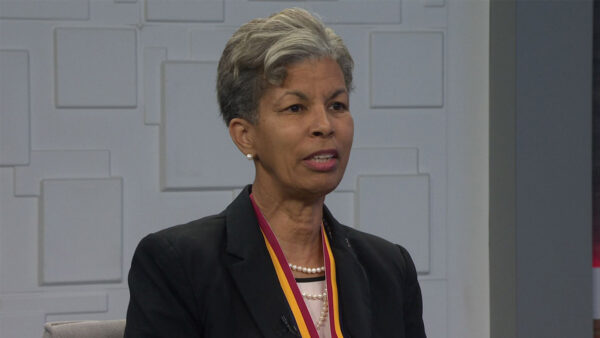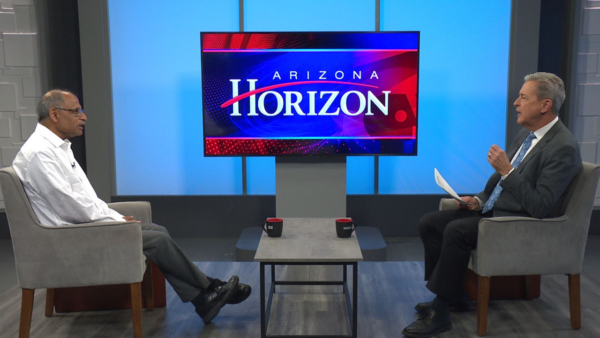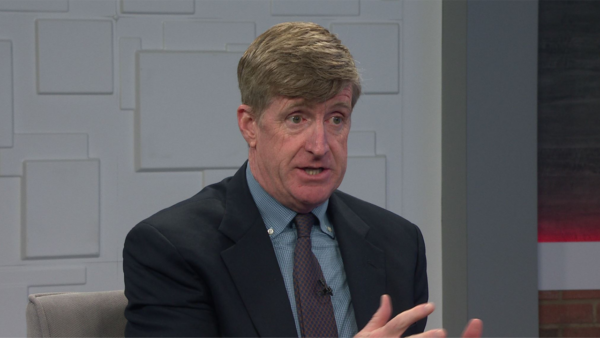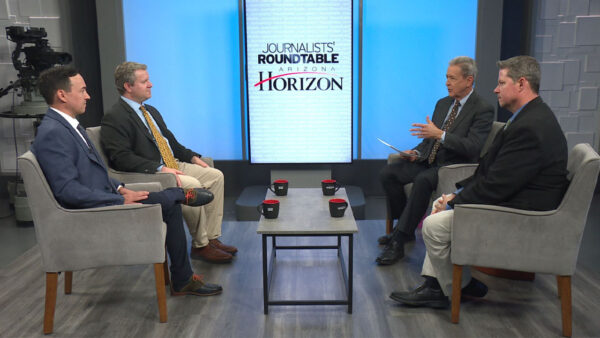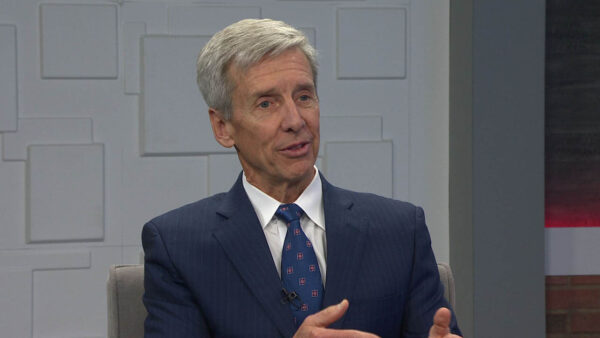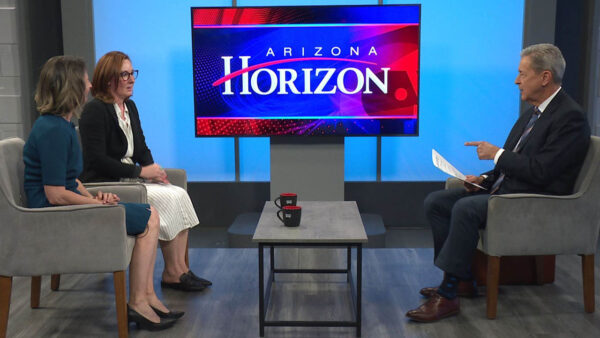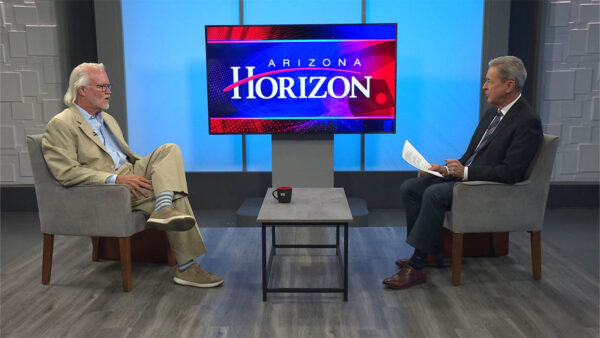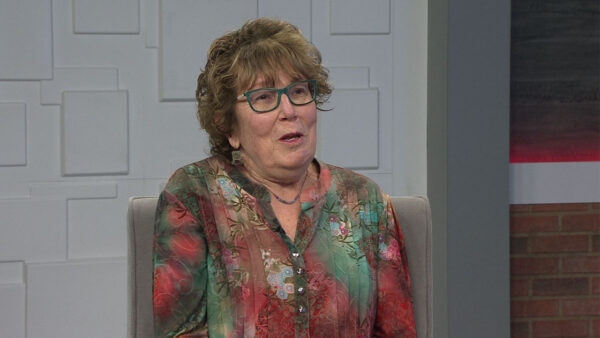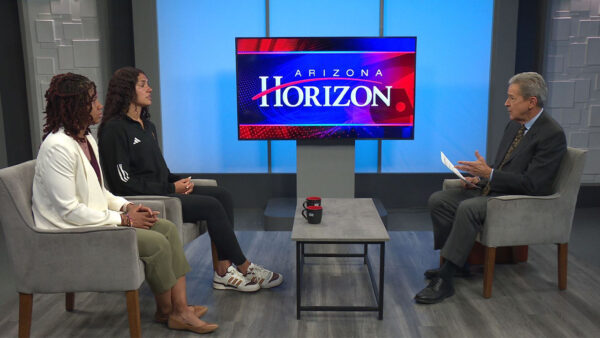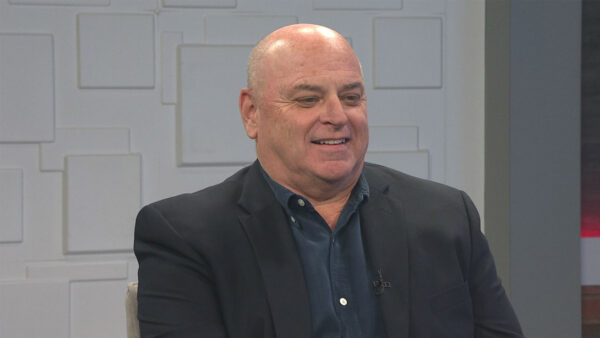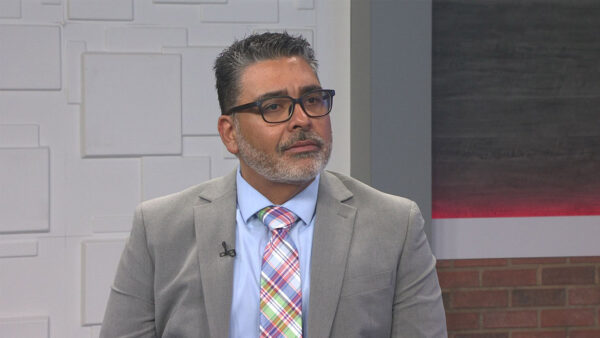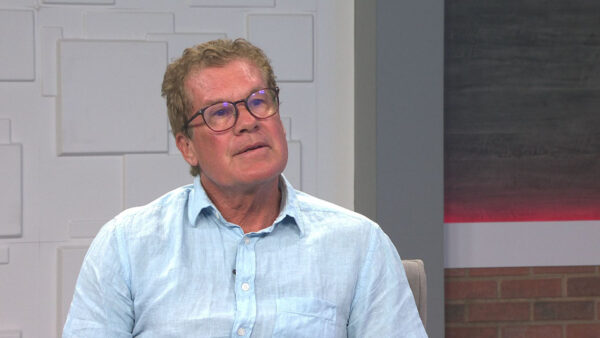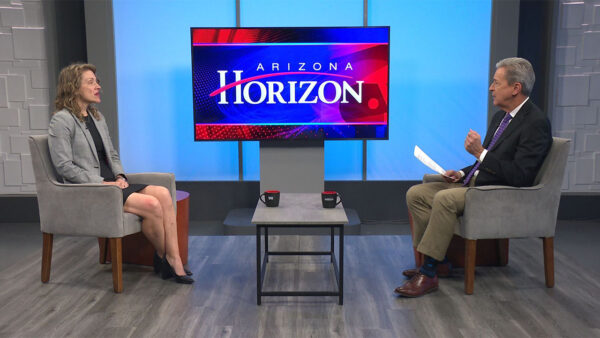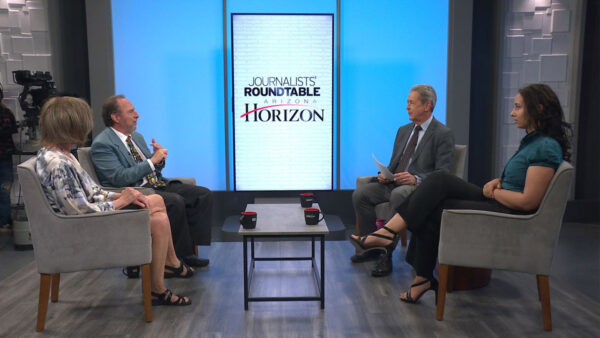State Representatives Jonathan Paton and David Bradley talk about legislative efforts to make Child Protective Services more accountable, in part by providing public access to CPS records about cases that result in a child fatality or near fatality.
>>Ted Simons:
When a child abuse investigation goes wrong, it can be difficult to find out why. Most of the information Child Protective Services (CPS) obtains is confidential, but State Lawmakers want to change that in certain cases. In part three of our series, "Protecting Arizona's Children" David Majure shows us how lawmakers are trying to improve CPS.
>>David Majure:
At the Arizona State Capitol, lawmakers are looking for ways to make child protective services more accountable to the public. One attempt is House Bill 2454. It requires CPS information to be made public in child abuse cases that result in a fatality or near fatality. One exception is when a County Attorney demonstrates that doing so will harm a criminal investigation. The very same language can be found in House Bill 2455. That bill goes further, by reclassifying when child abuse cases must be investigated jointly by CPS and law enforcement. Current law categorizes child abuse, child sex crimes, and felony domestic violence as "Extremely Serious Conduct Allegations": all of which require joint investigation. The bill changes the wording to call these things "Criminal Conduct Allegations." an attempt, according to the bill's sponsor, to treat kids who are abused as victims of crime. About one-third of the cases in Pima County during 2007 that should have been jointly investigated were not, according to a county prosecutor. One provision in the bill seeks to find out why. It requires both law enforcement and CPS to file separate annual reports listing the total number of child criminal conduct investigations, how many were investigated jointly, how many were not, and the reasons why a joint investigation did not take place. Another bill, House Bill 2159, deals with CPS and other public bodies by requiring them to maintain disciplinary records of employees and to make those records available to the public.
>>Ted Simons:
Joining me to talk about CPS legislation is Representative Jonathan Paton , a Republican from Tucson who was sponsoring a couple of the bills we just heard about. And Representative David Bradley, a Democrat, also from Tucson. He operates La Paloma Family Services, which provides group home and foster care services for children. Bradley is also a former employee of CPS Thank you both for joining us here on"Horizon".
>>Jonathan Paton, David Bradley:
Thank you.
>>Ted Simons:
Jonathan, are you sponsoring these bills as a direct result of some very high-profile cases in Tucson?
>>Jonathan Paton:
Absolutely. We heard about some very tragic cases in Southern Arizona. We held hearings on those cases, and eventually, we were able to construct some legislation to fix some of the problems that we found.
>>Ted Simons:
Are these - are we looking at things that should have been addressed, and maybe looked at years ago?
>>Jonathan Paton:
Well, I think there were important issues that maybe have not been addressed, but they really came to light because we sued, along with the Arizona Republic and other news organizations to open up the records in those cases. And that revealed some serious problems that we're trying to address.
>>Ted Simons:
David, before we get into some of the specific legislation, does CPS have the resources it needs to do the job?
>>David Bradley:
Well, it depends on how you define the job. It's a broad task that they have. The Child Protective Service system is broader than just CPS. it involves law enforcement, it involves the education system, faith-based organizations, mental health and substance abuse treatment agencies. All of us are involved, and the community as a whole is involved in the protection of children. CPS certainly has a specific task that they have to do to protect. But it is a huge task. There are over 23,000 children that are involved in the Child Protective Services system today. About 9,000 or so are in out of home care, another 14,000 are provided in-home services. It's an enormous task, enormous responsibilities. Hard to get people to do the job. for a variety of reasons. So do they have all the resources? Not as much as they need, and not as consistent as it needs to be. It needs a Legislature that will support them on a consistent basis.
>>Ted Simons:
Do you think the Legislature, right now, does not support CPS?
>>David Bradley:
I think in the time that I've been in the Legislature, we've had to fight tooth and nail to get support services in place for child protective services, particularly for substance abuse services, for in-home services. Every year, we've had to go to battle on those issues, and it's something we shouldn't have to do every year. Those things have to be in place in order to prevent the very things that we're trying to deal with here.
>>Ted Simons:
Jonathan, is that a fair assessment? you think that the Legislature is not quite up to speed as far as CPS is concerned?
>>Jonathan Paton:
Well, I think we have a lot of priorities we have to deal with. But one of the things that I've noticed in this whole process is that with the tremendous responsibility that Dave's talking about, you also have to have tremendous oversight and scrutiny. And that's why some of the key bills that we sponsored were to deal with transparency, opening up the process. We're talking about people who have an amazing responsibility to determine whether a child should be in a home or not, ultimately. Obviously, it goes to a judge. But what do you do if there is mistakes made? How can we improve the Agency as time goes on? Money is certainly important, but it's not the only factor that's involved. And you have to - we know that reform can only happen in an open, sun-lit environment.
>>Ted Simons:
And to that end, 2159, House Bill 2159 keeps employee disciplinary records open. Why is that important?
>>Jonathan Paton:
Because these are individuals that are being paid with taxpayer dollars. We see that already at the Municipal and County levels. Those records are open right now for City and County employees. But they're not for the State. It makes no sense in my mind to have those closed. We have some serious cases in Southern Arizona, media reports reported that we had a CPS worker that had a relationship with an abusive father, for example. That never would have - we never would have known that if someone had not leaked that. We want to make that simply open to the public to find out if there were those kinds of things happening.
>>Ted Simons:
David, does it make sense to you that all employees, State employees records should be open because of that particular situation?
>>David Bradley:
I think there's a - again, stepping back and looking at broader issues. There are standards of this profession - child welfare is a profession. There are standards, there's a body of knowledge. There's standards that have to be overseen. There are ethical standards that have to be overseen as well. So when we have a tragedy like this, one of the first things we do is step back and look with those glasses on. What happened on a micro-level? What happened with these particular cases? Who was with these children, specifically? Then we step back, and look at a macro-level. What systems were these children and families involved with? from Child Protective Services to law enforcement, mental health, substance abuse. And we evaluate: what went wrong? And if we conclude that part of the problem is on the microlevel, do we prosecute somebody? Do we fire somebody? Do we discipline somebody? And on a macro-level, do we step back, and say there's broader problems here, there's systems problems, people not communicating with one another? So, those are all important issues that come back to the point of people's personnel files, in my mind.
>>Jonathan Paton:
I think related just to what Dave just said, though, it's interesting to note that in that case, it was revealed that CPS did not have a specific Ethics Code of Conduct within their own Agency. And after that issue was leaked, they changed their own policy and they created an Ethical Standard. They have an Ethics Board that they go before now. They did not have a policy, for example, against relationships between CPS workers and clients. That did not exist. And that, to me, is the biggest argument for transparency. When we started to sue to get the records opened up, CPS transformed itself from within on several different cases. And I think that's the reason to keep going for reform.
>>Ted Simons:
David, that's always been a criticism of CPS, that there's so much secrecy there. And again, I understand privacy of family members, privacy of other innocents are involved in many of these cases. But how can reform happen when you can't see what needs to be reformed?
>>David Bradley:
I don't think anybody has any intention of covering those things up, or wants to cover those things up. I think transparency is good. Obviously, you have to deal with issues of confidentiality. And also, you don't want to jeopardize prosecution of people who need to be prosecuted. All those things have to be considered when you look at the bigger picture. But again, it's always a stepping back. It's always looking from a broader perspective. When I was a CPS worker, I assigned confidentiality issues. I assigned ethics standards. That was 25 years ago. And I know those things - again, when we look at it, specifically at these case - that is those things were not followed, those things have to be dealt with. That's a good part of transparency. There's no question that that's a good thing, to find those things out.
>>Ted Simons:
Are you concerned that some innocents, some family members, folks that are in the periphery of a fatal or near fatal case - we're now getting to 2454 here, are you concerned that they might be hurt by opening these records to the public?
>>Jonathan Paton:
Well, absolutely. It's one of our concerns that that doesn't happen, and for that reason, that's part of the negotiations that we went through. That we made sure that there's redaction for those people not directly involved. That they are redacted. That the redaction would happen with people who are witnesses, for example. We wanted to make sure that this affected fatalities and near fatalities. That's under Federal Law. We do not want to touch people that were not directly involved in - the perpetrator, for example, Because we felt that the people we're concerned about is how do these children die? What could we have done to change the outcome? And if we're not releasing those records, who are we protecting? Because these children are dead. Are we protecting the perpetrator? Are we protecting a bureaucracy? And I think the changes that we've made in the legislation, I think, protect children. I think they make those kinds of protections so that they won't be released unnecessarily.
>>Ted Simons:
And I know as well that you want to change the definition of child abuse. You want to actually change the definition. Explain.
>>Jonathan Paton:
Well, what we want to change, actually, is that basically it was called "Serious Conduct" or "Serious issues". There was some ambiguity there. The worst case that comes up. And we wanted to basically redefine it as a serious crime. Because that triggers certain protections for children that they are treated as victims of violent crime, for example, that they're given certain constitutional rights. That was another bill that we worked very hard on because there was some ambiguity there. What rises to that level? Crime is a pretty standard definition, and I think it was easier for CPS workers to understand, it was easier for law enforcement to understand, for them to work together.
>>David Bradley:
Again the issue of child well-being is the overriding issue. Under child well-being come issues of protection around permanency are all part of it - and when we go into homes, we actually go into a home and figure out, gee, what has happened here? You have an injured child. Under what conditions did this happen? What were stressors were at work? Again, what entities, what systems were at play, and didn't do their job, perhaps, or what cultural issues are coming into play that had an effect on this? All those stressors - and things have to be analyzed. And it's the level - skill level of the people that go in that is the crucial issue, and having what I call having collegiality: having as many eyes as possible. You can't say this particular incident reaches the level of a crime. I'm going to take this kid with me today. It may or may not be the best.
>>Ted Simons:
To that end, the CPS pair of eyes, are they getting a bad rap?
>>David Bradley:
Well, they can't help but get a bad rap because they're always in the "damned if you do, damned if you don't" situation. Working with families is always very stressful. And there's always going to be people that think, gee, either you err on the side of leaving a child, or you err on the side of taking a child. They're always in that dilemma. No matter what they do, they can't please everyone in the System. Protection and permanency are important, and a child well-being, in analyzing that and having as many eyes to look at that, is really the key to this issue.
>>Jonathan Paton:
But the bad rap that they have quite a often has been created by this veil of secrecy that the Agency has. There are a lot of good things that workers do, but we can't see those things because we don't always know what's going on. And I think that secrecy creates suspicion, which creates a cloud of suspicion for the Agency that, oftentimes, isn't fair. That's one of the reasons we're trying to open things up.
>>Ted Simons:
Alright, we have to stop it right there. Thank you both very much for joining us. We appreciate it.
Jonathan Paton:State Representative ;David Bradley:State Representative;





